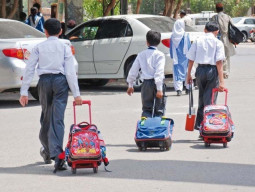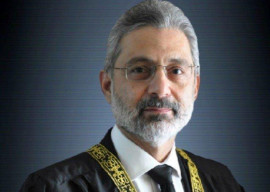
Here is a young man who was raised in what appears to have been a fairly liberal, well-off, well-connected and well-educated family in Pakistan. His father is a retired air marshall in the Pakistani Air Force. Then he comes to the US for higher studies, goes to a respectable university and marries a young Pakistani-American woman who it seems may have grown up here. From a photograph on the net, she appears to be an attractive, well put-together, non-hijabi woman. They have two young kids. For a while they lead a pretty good life, living in an upscale suburb of Connecticut, in a house that proved to be too expensive to maintain mortgage payments on once the recession hit, affecting countless folks like them who were already living beyond their means and then got laid off — as did Mr Shahzad.
This is the bare-bone narrative of Mr Shahzad's life prior to becoming a recruit for the Pakistani Tehreek-i-Taliban, and it reads like one many in the Pakistan-American community would be familiar with. It is the post-scenario that is scary because the question it raises for many of us is: how did he go from being part of the immigrant American dream to a poster-child for terrorism? The usual explanations such as those of class, race, religion, gender or ethnic oppression simply do not apply here. The only thesis that suggests itself is one involving loss of economic security, leading to a sense of shame and loss of face within the community — particularly acute for a man in a patriarchal class system, where his worth is assessed by the number of toys he can acquire and retain. Such a psychological state can become an easy recruiting tool for extremist ideology, particularly one rooted in an obscurantist and hate-driven interpretation of religion, in this case Islam — a return to which is portrayed by extremists as the cure for all ills emanating from western capitalist societies like the US.
While there are serious problems of class oppression, racism, and sexism which are endemic to a world dominated by a capitalist, patriarchal order that has to date benefited colonial and imperial powers and the neo-colonial elites, Mr Shahzad’s case hardly proffers a solution. Quite the contrary: he is part of the very elite his behaviour hypocritically condemns. Planting bombs in crowded places where intended victims are innocent folks representing all creeds and classes, is not going to change the system. Rather, his criminal thoughtlessness will bring more, not less harassment of those at the bottom of the economic heap from all backgrounds — and to Muslim Americans of all classes and ethnicities, particularly those from Pakistan.
Published in the Express Tribune, May 11th, 2010.







































COMMENTS (11)
Comments are moderated and generally will be posted if they are on-topic and not abusive.
For more information, please see our Comments FAQ